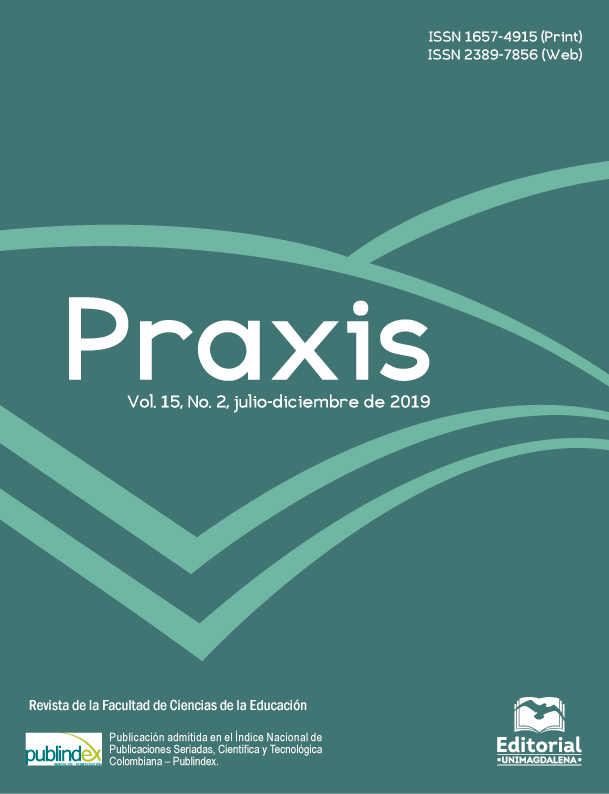Abstract
This article presents an analysis about work system organization inside higher education institutions; proposing the generation of new structures that repair troubles around the lack of planning, addressing and management, which substantially blocks the members of the educational community. Therefore, the document offers ideas associated with the professionalization of educational actions compared to the preparation of tasks in a work environment; based on a pedagogical-organizational project, which integrates the following factors: the identity features of administration model, the educational management perspective, the structure of a training course for managers and professors on the opening of learning and innovation; and, finally, the creation of the pedagogical and organizational strategy to improve management corporative practices. The methodology used was particularly focused on the observation of facts and realities (projective-holistic), centered on the subjects, and their relationships and interactions in the pedagogical and organizational context.References
Acosta Valdeleón, W. (2011). Gestión escolar y producción de subjetividad en Colombia, 1990-2005. Revista de la Universidad de La Salle, (56), 175-229.
Caldwell, B. J. y Spinks, J. (1992). Leading a Self-Managing School [Dirigir una escuela autogestionada]. Londres: The Falmer Press.
Camisón, C., Cruz, S. y González, T. (2006). Gestión de la calidad: conceptos, enfoques, modelos y sistemas (1ª edición). Madrid, España: Pearson Educación S.A.
Casassus, J. (1999). La gestión: en busca del sujeto. Santiago de Chile: UNESCO Orealc.
De Geus, A. P. (1988). La planificación como aprendizaje. Harvard Business Review, (36), 70-74.
Dubar, C. (2002). La crisis de las identidades. La interpretación de una mutación. Barcelona: Edicions Bellaterra.
Jackson, S. E. (2011). Making strategies stick. Journal Business Strategy, 32(1), 61-63.
Katz, S. y Earl, L. (2010). Learning about networked learning communities. School Effectiveness and School Improvement, 21(1), 27-51.
Kerr, C. (1963). The Uses of the University. Cambridge: Harvard University Press.
Koontz, H., Weihrich, H. y Cannice, M. (2012). Administración. Una perspectiva global y empresarial (14a edición). México D.F.: Mc Graw-Hill.
Menguzzato, M. (1993). La Dirección Estratégica. Un enfoque innovador del Managment. Valencia, España: Ed. Euroed.
Munuera, J. y Rodríguez, A. (2007). Estrategias de marketing: Un enfoque basado en el proceso de dirección. Madrid, España: ESIC Editor.
Peña, J. L. (2018). La gestión administrativa y financiera en los Institutos Politécnicos Industriales de la Educación Técnica y Profesional (tesis doctoral inédita), Holguín, Cuba.
Poggi, M. (2001). La formación de directivos de instituciones educativas. Algunos aportes para el diseño de estrategias. Recuperado de http://unesdoc.unesco.org/ark:/48223/pf0000129501
Porter, M. (2000). Estrategias Competitivas. México: CECSA.
Pozner, P. (2000a). Gestión educativa estratégica: diez módulos destinados a los responsables de los procesos de transformación educativa. Buenos Aires, Argentina: Instituto Internacional de Planeamiento de la Educación (IIPE).
Pozner, P. (2000b). Competencias para la profesionalización de la gestión educativa. Argentina: IIPE.
Schmelkes, S. (2009). El problema de la educación para la diversidad. En R. G. Mendoza Zuany (comp.), Gestión de la diversidad: Diálogos interdisciplinarios (pp. 17-34). Xalapa, México: Universidad Veracruzana.
Sérieyx, H. (1994). El big bang de las organizaciones. Cuando la empresa entra en mutación. Barcelona: Granica.
Senge, P. M. (1990). La quinta disciplina. Cómo impulsar el aprendizaje en la organización inteligente. Buenos Aires, Argentina: Granica/Vergara.
Senge, P. M. (1998). La Quinta Disciplina. México: Editorial Granica.
Slater, S. (1996). The challenge of sustaining competitive advantage. Industrial Marketing Management, 25(1), 79-86.


